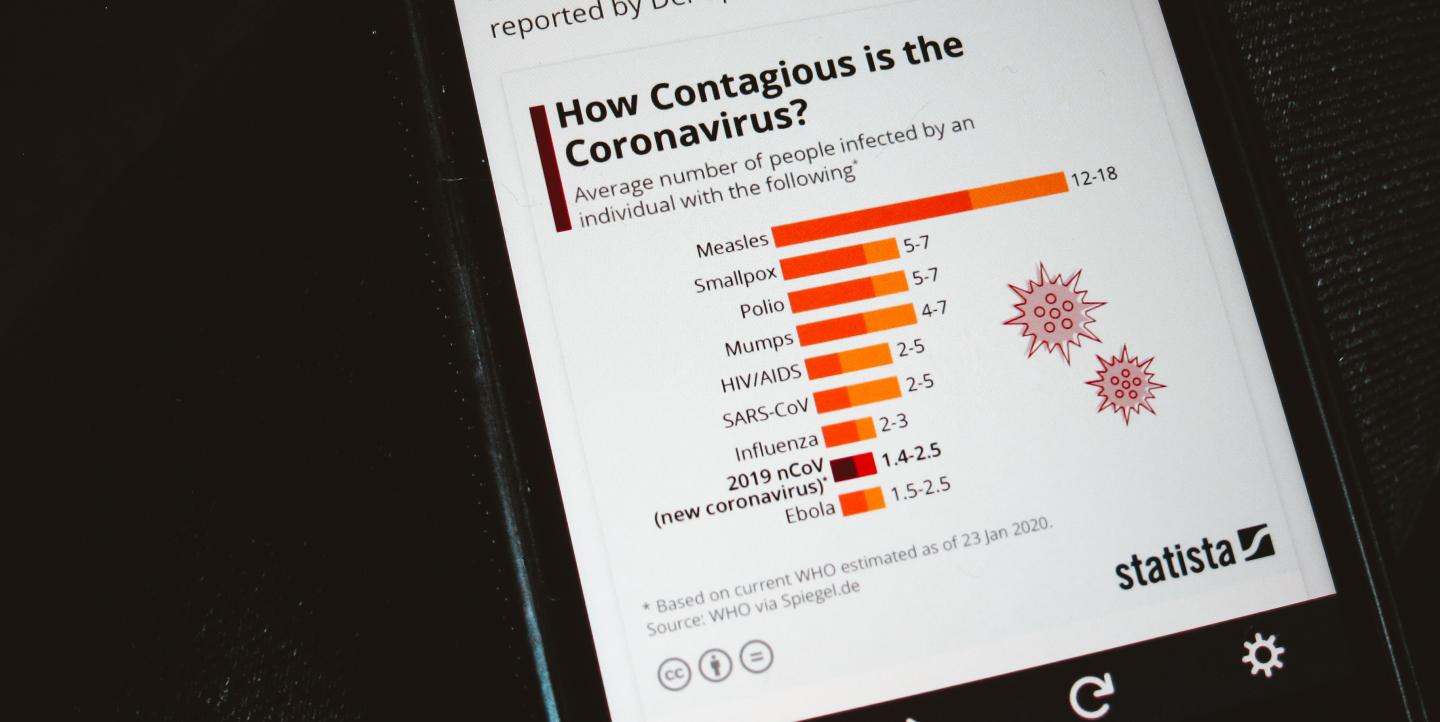We talked with science journalist Valeria Román as part of the Global Health Crisis Reporting Forum — a project with our parent organization, the International Center for Journalists (ICFJ). Román is a member of the World Federation of Science Journalists.
This article is part of our online coverage of reporting on COVID-19. To see more resources, click here.
Business, politics, travel, lifestyle: no matter the beat, most journalists are now reporting on the COVID-19 pandemic. This has required journalists to step into an area that until recently seemed reserved only for science and health reporters. To carry out this coverage effectively, reporters are familiarizing themselves with new concepts, sources and data.
In this article, we’ve compiled tips from Argentinian science journalist Valeria Román to help journalists report effectively during this crisis. She shared her advice with us during a Global Health Crisis Reporting Forum webinar last week.
(1) Understand key concepts
Reports from the World Health Organization (WHO) contain new and potentially confusing terms. For example, two important terms the WHO included in their Strategic Preparedness and Response Plan, shared in February to help countries prepare for COVID-19, refer to the phases of response to the virus.
During the containment phase, the following cases of COVID-19 are present:
-
Imported: people with the virus who became infected after traveling to another country, and especially high-risk areas. The high-risk areas have moved from China first, to countries in Europe like Italy and Spain, and now to the United States.
-
Close contacts: people who became infected from imported cases but did not travel to another country.
The mitigation phase occurs when there is already community transmission — another key term. WHO identifies community transmission when officials are unable to relate confirmed cases of the virus.
[Read more: 10 worldwide journalism opportunities with deadlines in April]
(2) Don’t obsess over success
Comparing data with countries like South Korea that have slowed the pandemic can help journalists identify and relay what worked and what didn’t. We shouldn’t obsess over success stories, however, said Román. Remember, this is a new virus, so we should keep in mind the following:
-
There are many approaches to intervention that are being tested just now.
-
Countries in Asia like China or South Korea already have significant experience in handling similar viruses, such as the one that caused the Severe Acute Respiratory Syndrome (SARS) outbreak in 2002-03.
(3) Consult reputable sources
As the coronavirus spreads, another pandemic is growing: misinformation around the disease. To combat this infodemic, it’s important to understand which sources are reliable to use in your reporting.
Journalists everywhere should follow updates from their countries’ health authorities, Román recommended. Reporters should also seek information from WHO, and reporters in Latin America can visit the Pan American Health Organization (PAHO). Latin American journalists should contact their local PAHO office if local data is unreliable.
Expert information can also be found in scientific journals like The Lancet, Science, Nature, and JAMA. It’s important to note, however, that these studies in some cases aren’t following their typical review processes, due to the speed with which they’re trying to publish during the crisis, Román cautioned.
Additional sources include infectious or epidemiological medical associations, medical institutions and schools in each country. "Even if they do not have the data themselves, these sources can help find data that authorities do not provide," Román added.
Many experts and specialists today are working around the clock to respond to the ongoing crisis. As a result, the best source for a topic may not be available to give interviews. In these situations, don’t settle for talking heads simply offering their opinions. "Today, it is key not to be carried away by opinion or typical common sense," Román said.
[Read more: Key quotes: Are our health systems prepared for COVID-19? Q&A With Dr. Claire Standley]
(4) Exercise a healthy skepticism regarding treatments
There are two types of treatments being tested now for the novel coronavirus, according to Román. The first is the search for new therapies that haven’t been used before. The second is research around drugs that are currently used to treat other diseases. Most treatments discussed to date do not have strong evidence to support their effectiveness.
When reporting on potential treatments, Román recommended that journalists ask, “What evidence exists to support them?” This will help determine what research was conducted, how many people the treatments were tested on, and how effective they were.
"When you start asking all these questions, you start to realize the weaknesses of the treatments," she said.
(5) Consider how best to include testimonials
It can be important to share stories of those who have been afflicted by the disease. When it comes to incorporating first-hand experiences, it is critical that you respect patients, and mind their rights to privacy and dignity.
In addition, while sharing these stories can inject optimism, if done poorly they can weaken public health interventions to slow the pandemic. “These particular cases may be recovered and feel-good, but that is not the case for many people. This can erode the message to act as soon as possible,” said Román.
(6) Examine ethical dilemmas
Reporters should be mindful of ethical gray areas surrounding countries’ responses to the pandemic. For example, South Korea’s success is often highlighted. They’ve used mass testing, tracking and isolation of patients to combat the virus.
Román noted that the government was able to carry this out by accessing their citizens’ personal data, delving into the privacy of all patients. This is an ethical side to the issue journalists must keep in mind, Román advised.
(7) Take care of yourself
The COVID-19 pandemic is a massive story that is affecting many aspects of our society, and journalists are covering it as much as possible. Román urged reporters to make sure they’re taking care of themselves.
“This coverage is going to change all of our lives as professionals. You have to take care of yourself individually,” she said. “The demanding coverage makes us forget that we are also human.”
The Global Health Crisis Reporting Forum from ICFJ and IJNet connects journalists covering the novel coronavirus pandemic with leading health experts, resources and each other. Learn more and join the Forum through its Facebook group. Journalists can use these insights and quotes in their stories.
Main image CC-licensed by Unsplash, vía Hello I'm Nik.


